Analysis
Algeria’s Secret War Machine: How a Nation Fuels Africa’s Terrorism

Algeria’s secret backing of militias and extremist groups threatens regional stability as Western powers remain silent.
Uncover how Algeria covertly funds and arms terror groups across Africa, fueling insurgencies and reshaping geopolitical dynamics under diplomatic cover.
Algeria, long perceived as a diplomatic mediator in North Africa, is unmasked as a key enabler of Africa’s deadliest insurgencies. Mounting intelligence and intercepted arms shipments reveal a calculated Algerian strategy: arming extremist militias and separatists to destabilize rivals and position itself as a regional kingmaker.
At the epicenter of this clandestine operation lies Algeria’s unyielding support for the Polisario Front, the militant separatists fighting Morocco over Western Sahara. Algeria has provided the Polisario with Russian-made MANPADS and Iranian drones—dangerously sophisticated weaponry that threatens to ignite a broader conflict. This isn’t solidarity; it’s proxy warfare designed to keep Morocco embroiled in a perpetual crisis while Algeria watches from a comfortable distance.
But Algeria’s shadow influence reaches far beyond Western Sahara. In the Sahel, a region devastated by jihadist insurgencies, Algerian weapons routinely find their way into the hands of notorious extremist groups like Al-Qaeda in the Islamic Maghreb (AQIM) and ISIS affiliates. Despite public denials, intelligence sources reveal that Algeria deliberately allows weapons to filter into these insurgencies, thus amplifying chaos and asserting itself as an indispensable regional power broker.
At the heart of this covert war lies Algeria’s Department of Intelligence and Security (DRS)—a secretive military intelligence agency whose agenda prioritizes strategic autonomy through destabilization. Unlike Morocco, which engages diplomatically and economically, Algeria’s military-led leadership covertly fuels insurgencies to achieve geopolitical objectives, playing a double game that allows it to simultaneously condemn and enable terrorism.
Alarmingly, Algeria’s shadow war is bolstered by deep ties to Russia and Iran. As Africa’s largest importer of Russian arms, Algeria stockpiles weaponry that is subsequently funneled to non-state actors. The emergence of advanced Iranian drones in regional conflicts underscores Algeria’s calculated effort to spread instability and reshape power dynamics without direct accountability.
Yet, the international community has been dangerously silent. European powers reliant on Algerian gas, and the U.S., entangled in global geopolitical crises, remain reluctant to confront Algeria directly. However, voices in Washington calling for sanctions under CAATSA are growing louder, indicating cracks in Algeria’s diplomatic armor.
Ignoring Algeria’s secret war risks plunging Africa further into chaos. It’s time the West held Algeria accountable, exposed its double game, and acted decisively to halt its deadly influence before the region spirals irreversibly out of control.
Analysis
Merz’s Coalition: Germany’s Answer to Trump’s Trade Blitz and Putin’s War Machine
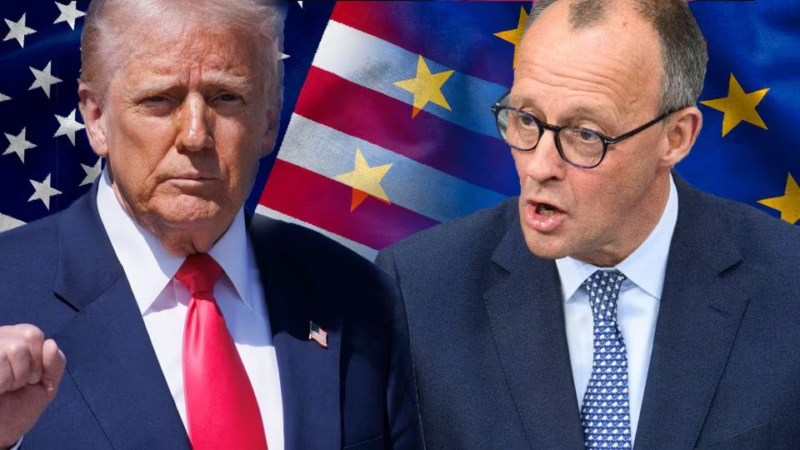
Under pressure from Trump’s tariffs and Putin’s aggression, Germany’s new chancellor builds a rapid-fire coalition to reassert European leadership and restore stability.
Friedrich Merz seals a high-stakes coalition to counter Trump’s economic shockwaves and Putin’s war threats. Germany is back—with debt-fueled defense, tougher borders, and a warning to Washington.
Germany blinked, then moved fast. With Donald Trump hurling 20% tariffs at the EU and Vladimir Putin digging deeper into Ukraine, Friedrich Merz did what German leaders rarely do—he moved with speed. Just 45 days after his snap election win, Merz sealed a powerful coalition deal with the center-left SPD, not out of political convenience, but out of strategic necessity.
This isn’t just domestic politics—it’s about survival. Trump’s trade war is blowing a hole through Germany’s industrial heartland. Putin, undeterred and emboldened, watches Europe flounder. And the United States, once a security guarantor, now looks more like a wildcard. For Berlin, the old transatlantic order is dead—and Merz knows it.
His coalition, fast-tracked under extraordinary pressure, promises billions in military and infrastructure spending, not out of generosity but to plug the vacuum left by America’s retreat. But Merz’s problem is internal too: while EU leaders cheer the deal, back home his own base sees betrayal—fueled by AfD populists calling him weak on borders and sold out to the left.
That’s why Merz pivoted hard on migration: slamming shut asylum routes, promising deportation surges, and pushing “safe country” designations. It’s a political firewall against the far-right, but also a gamble that could fracture Germany’s social fabric.
Still, Merz had no choice. Trump’s tariffs and unpredictable diplomacy have shattered Europe’s illusions. The era of Germany hiding behind NATO is over. If Berlin wants influence, it has to pay—and fight—for it.
Merz’s message to Trump was simple: Germany is back. But the real message, loud and clear, was to Europe: the gloves are off, and Berlin is done waiting for America.
Analysis
China Strikes Back: Trump’s Trade War Just Triggered a New Cold Front
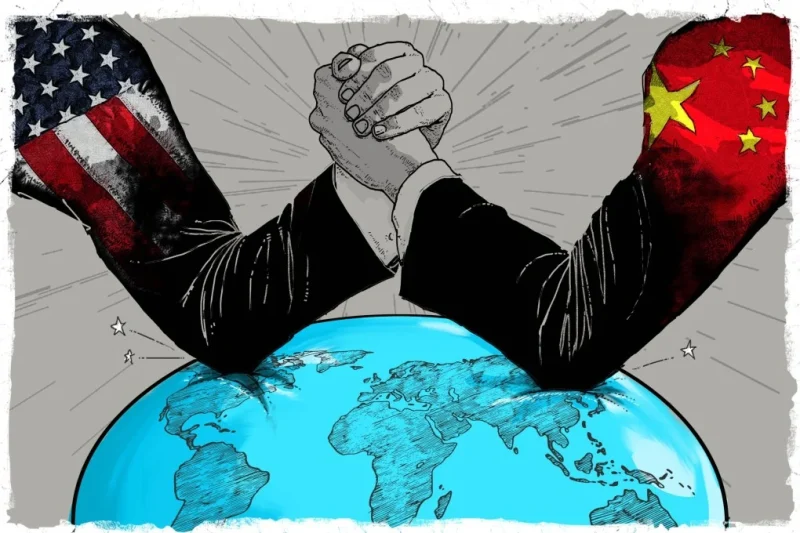
Beijing fires back at Trump’s 50% tariff with crushing 84% duties, bans on top U.S. defense firms, and a bold message to Washington: Enough is enough.
The trade gloves are off. China has just escalated its standoff with the United States into a full-blown economic cold war. Less than 48 hours after President Donald Trump unleashed a crushing 50% tariff on all Chinese imports, Beijing retaliated with ferocity: 84% total tariffs on U.S. goods and sweeping sanctions on 18 American defense contractors.
This isn’t tit-for-tat. It’s a calculated declaration that China is ready to match Trump’s aggression dollar for dollar — and missile for missile. The 18 companies, including military AI developer Shield AI and elite U.S. Air Force partner Sierra Nevada Corporation, are now blacklisted under Beijing’s “unreliable entities” framework. Translation? They’re locked out of China — no investments, no exports, no excuses.
The timing is as political as it is economic. These firms weren’t just targeted for trade; they were hit for arms deals with Taiwan, the democratic island Beijing vows to reclaim. The message from Xi Jinping’s government couldn’t be clearer: Play with fire in Taiwan, and your defense contractors burn.
So what’s the real fallout? While most of these companies don’t rely heavily on Chinese markets, Beijing knows how to exploit soft points in global supply chains. Just ask U.S. drone maker Skydio, which lost its Chinese battery source overnight after past sanctions. This move isn’t about business — it’s about leverage.
And still, amid this economic artillery exchange, China sends a chilling whisper to global investors: “Don’t worry — this won’t affect the honest ones.” But who defines honesty when geopolitical fault lines crack deeper every day?
Trump wanted a trade war. What he got was China’s economic kill switch flipped — not just in tariffs, but in strategic deterrence.
Because this isn’t just trade. It’s a battlefield — and the weapons are sanctions, supply chains, and national pride.
Analysis
Can Al-Sharaa’s Government Turn War-Torn Ruins into a Unified Nation?
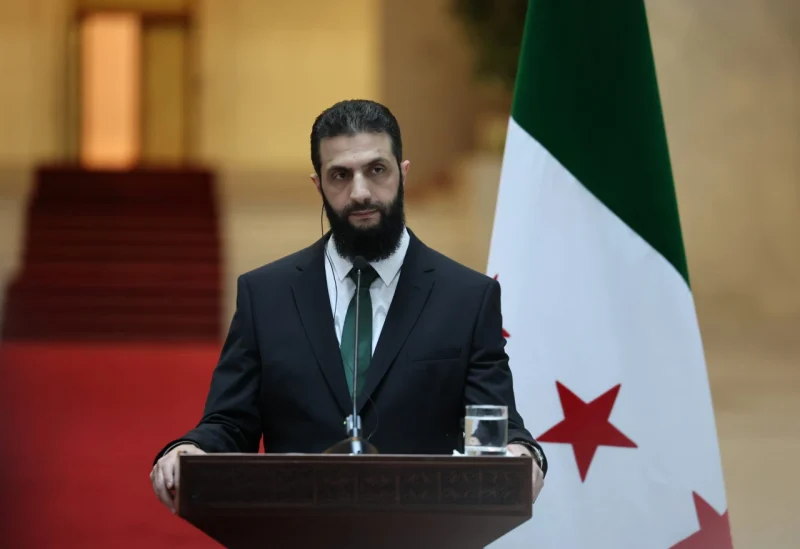
Syria’s post-Assad leadership under Ahmed al-Sharaa outlines reconstruction, unity, and disarmament as priorities—but faces daunting internal and geopolitical obstacles.
After 15 years of civil war, Syria’s future hinges on one question: can the transitional government under President Ahmed al-Sharaa transform devastation into durable unity—or is this just the calm before another storm?
In their first official meeting on April 7, Sharaa’s government laid out an ambitious plan that reads like a blueprint for national resurrection. Reconstruction, integration of fractured regions, economic revitalization, and disarmament are the pillars. Yet behind every promise is a political landmine.
Sharaa himself—once the commander of the Islamist faction Hayat Tahrir al-Sham—now helms a government with surprising diversity: ministers representing Christians, Druze, Kurds, and even Alawites. This cosmetic inclusivity is designed to telegraph a message: this is not Assad’s Syria. But it may not be enough to convince a war-weary population still recovering from displacement, famine, and chemical attacks.
The biggest challenge? Territorial fragmentation. Turkey still controls chunks of northern Syria. The US-backed Syrian Democratic Forces (SDF) run the east. The recent deal between Sharaa and SDF commander Mazloum Abdi hints at a future merger—but it’s a fragile hope, not a certainty. And Iran, never far from Syria’s power grid, continues to loom in the background, quietly assessing how this transitional order threatens its regional interests.
Reconstruction sounds noble, but in practice it’s a logistical and financial nightmare. Entire cities must be rebuilt from scratch. Refugees are returning, only to find homes razed and services non-existent. The plan to reintegrate militias and dissolve non-state armed groups is bold—but could easily spiral into another power struggle.
Sharaa’s government also faces the delicate balancing act of civil peace and media control. Calls for “inclusive, national discourse” are loaded in a post-dictatorship context. Who decides what is inclusive? And can Syria build unity without honest reconciliation or transitional justice?
There is promise in Sharaa’s roadmap—but it’s crawling with risks. Without serious international backing and internal discipline, the new Syrian state could collapse under the same fault lines that doomed its predecessor.
The next 12 months will determine whether this new government is a bridge to peace—or just another fragile experiment in a country that’s seen too many false dawns.
Analysis
Trump’s Warm Embrace of Israel Comes at a Strategic Cost
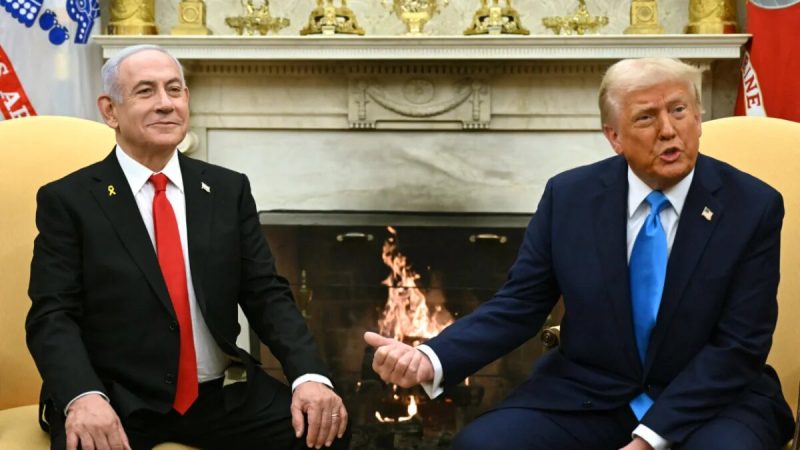
Why Netanyahu’s Silence on Iran Talks Signals the Hidden Costs of Trump’s ‘Unbreakable’ Alliance with Israel.
Donald Trump may be Israel’s loudest cheerleader, but his friendship comes with invisible chains.
When Trump told the world he would begin negotiations with Iran—Israel’s arch-nemesis—there was no protest, no backlash, not even the usual background grumbling from Netanyahu’s allies. Compare that to the firestorm during Obama’s 2013 backdoor talks with Tehran: Israel fumed publicly, lobbied Congress, and nearly tore apart the U.S.-Israel relationship over the 2015 Iran nuclear deal. But today? Silence.
That silence is the price of loyalty.
Trump’s presidency has showered Israel with favors: the embassy move to Jerusalem, recognition of the Golan Heights, and unrestricted military aid. His alignment with Netanyahu has been so absolute that dissent now feels ungrateful—politically unthinkable. Trump isn’t just a supporter; he’s become a force Israel can’t afford to challenge. The result? A strategic muzzle.
While Trump announced his Iran talks openly, unlike Obama’s secret diplomacy, it still positions Israel awkwardly. Tehran remains the head of a vast regional octopus—Hamas, Hezbollah, Houthis, Iraqi militias—all degraded but not dead. The moment cries out for pressure, not negotiation. Yet Netanyahu, boxed in by Trump’s embrace and a Republican-dominated Congress, lacks room to maneuver.
No one in Jerusalem wants to risk alienating the only president who openly brags about being Israel’s “greatest friend ever.” But the irony is brutal: Trump’s overwhelming support has robbed Israel of the freedom to say “no”—even when it matters most.
In diplomacy, loyalty is never free. Trump’s pro-Israel rhetoric may be thunderous, but his actions, like courting Iran, reveal a quieter truth: in this new friendship, Israel is expected to follow—not lead.
And in the high-stakes game of Middle Eastern power, even allies must sometimes resist. Netanyahu’s silence shows what happens when they don’t.
Analysis
U.S. Pulls Out of Key Ukraine Arms Hub in Poland: Strategic Streamlining or Silent Retreat?
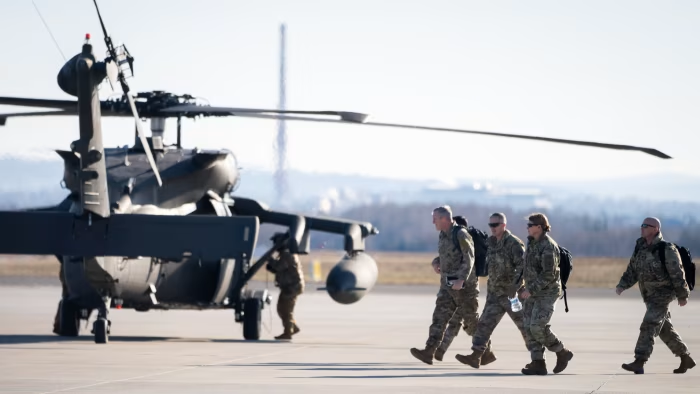
As the U.S. downsizes at Poland’s Jasionka base, questions rise over NATO cohesion, Trump’s intentions, and Europe’s defense future.
The U.S. military’s quiet exit from the Jasionka logistics hub — the lifeline of Ukraine’s war effort — is more than just a “streamlining” of operations. It’s a seismic signal: Washington is pulling back from the frontlines of European defense, and the implications are explosive.
Since 2022, Jasionka has been ground zero for NATO’s weapons pipeline to Ukraine. It’s no exaggeration to say 95% of lethal aid has passed through this Polish corridor. And who ran it? U.S. forces — until now. As of this week, the baton has been handed to Norway, Germany, the U.K., and Poland. But the question looms: Why now — and at what cost?
The Pentagon calls this a long-planned realignment. But that’s spin. The real driver is Donald Trump’s shifting doctrine: America First, Europe second — if at all. His disdain for NATO has morphed from rhetoric into reality. His threats to abandon allies and his backdoor dealings with Russia aren’t whispers anymore; they’re warnings. With his trade war and open hostility toward Canada and Greenland, the unraveling of post-WWII Western alliances is already in motion.
Poland — NATO’s new poster child for military spending — isn’t the problem. With 4.7% of GDP going to defense, it’s more committed than most. Warsaw is doing its part. The real issue is what this U.S. drawdown means: America is testing the limits of alliance dependency, gauging how far it can push Europe into standing on its own.
What’s being quietly set up in the background is NATO’s Security Assistance and Training Command for Ukraine, a move to shift operational control from the U.S. to a broader — and perhaps weaker — European leadership model. Sure, this spreads the burden. But it also diffuses accountability and fractures unity.
Let’s not sugarcoat this: the removal of U.S. troops from a critical war zone logistics hub during a hot war is not efficiency. It’s a red flag. And it may be the first of many.
Europe must now face a hard truth: Trump’s America is no longer the bulwark it once was. And if NATO crumbles, the chaos that follows won’t stop at Ukraine’s borders. It will creep into the heart of Europe — and into the balance sheets, war rooms, and borders of every allied state that let its guard down.
This isn’t just a logistics shuffle. It’s a strategic withdrawal. And it should terrify every Western policymaker.
Analysis
The SSC-Khaatumo Mirage vs. Somaliland’s Sovereign Might
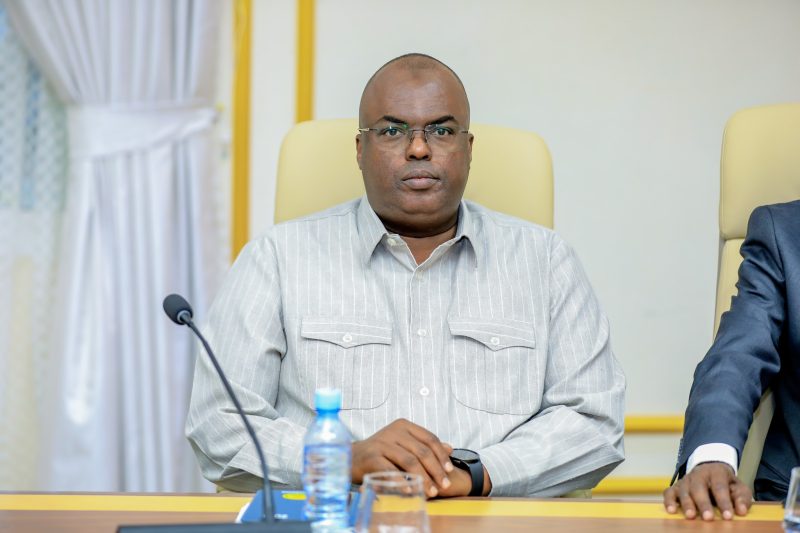
From clan militias to drones and diplomacy — why Somaliland’s structured power dwarfs SSC-Khaatumo’s fragile façade.
Prime Minister Hamza Abdi Barre’s canceled visit to Las Anod is more than a security setback — it’s a seismic exposure of Mogadishu’s vulnerability and Somaliland’s tightening grip over the contested city. The trip, touted as a symbol of federal unity, has morphed into a diplomatic disaster, revealing Barre’s isolation, SSC-Khaatumo’s fragile hold, and Somaliland’s growing edge in military intelligence and strategic depth.
SSC-Khaatumo’s bold declaration to safeguard Barre’s visit rings hollow in the face of credible assassination threats and Mogadishu’s unwillingness to roll the dice. While SSC claims control, Barre’s own advisors reportedly warned of “neutralization” operations—coded language for targeted elimination—should he set foot in Las Anod. These aren’t empty threats; Las Anod is soaked in the blood of assassinated leaders and long-standing clan vendettas. It’s a city where political ambition meets lethal memory.
What’s changed? Everything. Somaliland isn’t just talking tough; it’s quietly becoming a regional tech-military hybrid. With growing ties to Israel, advanced drones, AI-backed surveillance, and strategic diplomacy, Hargeisa is no longer a neglected breakaway — it’s a sovereign actor-in-waiting. And it has one message for Mogadishu: Cross this line and you’ll pay.
Barre’s retreat is not just tactical; it’s symbolic. His recent anti-Israel rhetoric has alienated key Western players, undermining Somalia’s quest for stability and recognition. Worse, it projects weakness. While Mogadishu issues hollow calls for unity, it fails to control the ground in Las Anod — or even protect its own leader there.
SSC-Khaatumo is now left exposed. Their federal backer blinked. And Somaliland is watching — armed, patient, and ready to seize the narrative.
In this escalating war of legitimacy, Barre’s misstep may have just handed Hargeisa a recognition victory. Somaliland didn’t need to block the visit. Fear did that job for them.
Las Anod is no longer neutral ground — it’s a geopolitical fault line. And only one side came ready for war.
Analysis
Can Britain Survive Without U.S. Intelligence? The Looming Crisis and UK’s Strategic Dilemma
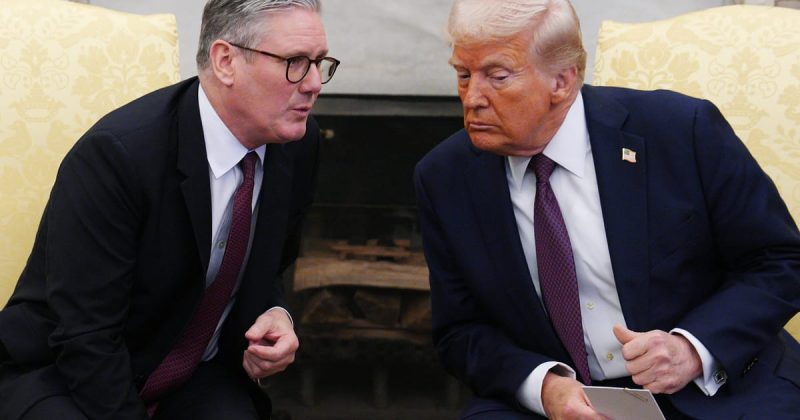
Recent frictions between the United Kingdom and the United States have exposed vulnerabilities that many thought impossible. Donald Trump’s America, once Britain’s most reliable ally, has become a source of uncertainty, especially in the crucial area of intelligence sharing. Britain’s security and geopolitical strategy hinge significantly on this partnership, raising the existential question: Can Britain live without American intelligence?
Historically anchored through the Five Eyes alliance, comprising the UK, U.S., Canada, Australia, and New Zealand, this intelligence-sharing agreement is vital. The interweaving of intelligence capabilities—especially signals intelligence (SIGINT)—has become deeply embedded, almost inseparable, over decades. However, Trump’s abrupt moves, such as cutting intelligence to Ukraine and the shocking revelation of a national security advisor’s carelessness with sensitive information, have alarmed British officials.
Britain possesses key intelligence assets, notably critical listening posts like Ayios Nikolaos in Cyprus, essential for monitoring the strategically sensitive Eastern Mediterranean region. The U.S. relies significantly on these UK facilities. Similarly, Britain hosts American intelligence infrastructure, notably RAF Menwith Hill, making a complete split practically difficult and operationally costly for the U.S. Yet, the growing unreliability under Trump’s administration has forced the UK to contemplate previously unthinkable scenarios.
The intelligence integration extends beyond human networks to deeply entrenched technological collaborations. Britain’s GCHQ works in tandem with the NSA, with personnel frequently interchanging. American investments via organizations like DARPA and In-Q-Tel have cemented this technological dependence, raising troubling questions about British sovereignty in critical defense technologies and infrastructure.
Despite these complexities, some British insiders argue for the urgent need to rethink the UK’s reliance on America. The troubling possibility that key U.S.-origin technology, such as the F-35 fighter jets, could be strategically limited or disabled in a crisis has heightened concerns. Moreover, politically aligned billionaires like Elon Musk and Peter Thiel, deeply embedded in British tech and defense infrastructure, have introduced additional risks linked to American domestic politics.
In response, Britain’s government faces tough choices. Building independent intelligence capabilities or shifting focus towards European partnerships are possibilities, but neither is quick nor inexpensive. Moreover, European intelligence cooperation still lacks the profound trust and integration characterizing the UK’s partnership with the U.S. The crisis of trust triggered by America’s recent moves could take decades to mend, highlighting Britain’s dilemma.
Yet, amid this uncertainty lies opportunity. The UK’s potential to step forward as Europe’s intelligence and defense leader has become plausible. With the U.S. increasingly viewed skeptically by NATO allies, Britain emerges as a natural leader capable of reorienting and revitalizing these alliances.
In conclusion, while fully disentangling from American intelligence seems improbable in the short term, Britain must prepare for a future where U.S. reliability is no longer guaranteed. This shift requires substantial investment, strategic realignment, and an honest assessment of risks. For Britain, the time for complacency has passed; it must decisively plan for a future where independence from American intelligence might become not just preferable but essential.
Analysis
Europe’s Deep Sea Dilemma: Russia’s Shadow War Beneath the Waves

Europe is fighting a shadow war, and this time the front lines are submerged beneath the Baltic Sea. Mysterious sabotage targeting crucial undersea cables—essential for the continent’s internet connectivity and power supply—is causing alarm across European capitals. The suspected culprit: Russia, engaging in a high-stakes game of geopolitical brinkmanship that, while not yet warfare, feels disturbingly close.
In the last 18 months alone, the Gulf of Finland has seen multiple sabotage incidents, damaging at least 11 undersea cables since 2023. Despite the significant disruption potential, the sabotage has thus far caused limited direct harm to daily life. Yet, the implications are profoundly unsettling: Europe now lives with the chilling awareness that Moscow holds a silent, destructive power just offshore.
Finnish coast guard deputy commander Ilja Iljin is at the forefront of efforts to curb these attacks. Yet, even with robust patrol fleets and advanced surveillance technology, securing thousands of kilometers of seabed is nearly impossible. “This is becoming more common,” Iljin admits, underscoring the difficulty of thwarting low-cost, high-impact sabotage.
Baltic Sea Under Siege: Power Cable Break Raises Concerns of Sabotage in Finland-Estonia Link
The targets are strategic and worryingly accessible. Subsea data cables are merely arm-thick, while power cables, although sturdier, are vulnerable to damage from ship anchors—exactly what happened with the Eagle S vessel last December. Once damaged, these cables require costly and prolonged repairs. The limited global fleet of specialized repair ships means even minor disruptions could cause lengthy outages, sparking chaos in Europe’s tightly connected economies.
Undersea Cable Cuts in the Baltic Sea: A New Front in Geopolitical Tensions
Though direct Russian responsibility remains unproven, analysts view these incidents as classic Kremlin tactics—destabilizing Europe while maintaining plausible deniability. Nick Childs, a maritime defense expert, notes that sabotage is a convenient gray-zone strategy, serving as a quiet yet potent threat against increased European support for Ukraine.
Europe’s response is ramping up. NATO’s “Baltic Sentry” initiative deploys naval drones and frigates, and the EU is investing €540 million to enhance resilience, including stocking spare cables and specialized repair vessels. Yet, legal hurdles persist. International maritime law complicates direct action against suspicious vessels operating beyond territorial waters, as illustrated when China shielded the Yi Peng 3 tanker from a full investigation.
Moreover, geopolitical tensions heighten as former U.S. President Donald Trump’s isolationist stance threatens transatlantic cooperation. If Russia intensifies sabotage, particularly targeting Norwegian gas pipelines or isolating EU islands like Ireland and Malta, Europe could face catastrophic energy disruptions and soaring prices.
Europe stands at a critical juncture, compelled to strengthen maritime defenses against a hidden, creeping threat beneath the waves. How effectively Europe navigates this peril could redefine regional security for decades, setting a stark precedent in the new era of geopolitical confrontation.
-

 Analysis1 month ago
Analysis1 month agoSaudi Arabia’s Billion-Dollar Bid for Eritrea’s Assab Port
-

 ASSESSMENTS1 week ago
ASSESSMENTS1 week agoOperation Geel Exposes the Truth: International Community’s Reluctance to Embrace Somaliland as a Strategic Ally
-

 Somaliland2 months ago
Somaliland2 months agoSomaliland and UAE Elevate Ties to Comprehensive Strategic Partnership
-

 Africa1 year ago
Africa1 year agoHow Somaliland Could Lead the Global Camel Milk Industry
-

 Analysis12 months ago
Analysis12 months agoIran escalates conflict, attacking Israel; US forces help Israel to intercept Iranian projectiles
-

 Top stories10 months ago
Top stories10 months agoGunmen Kill 11 in Southeastern Nigeria Attack, Army Reports
-

 Analysis12 months ago
Analysis12 months agoIsrael and Iran on Edge: Tensions Escalate Amidst Rising Threats
-

 TECH11 months ago
TECH11 months agoZimbabwe Approves Licensing of Musk’s Starlink Internet Service





























